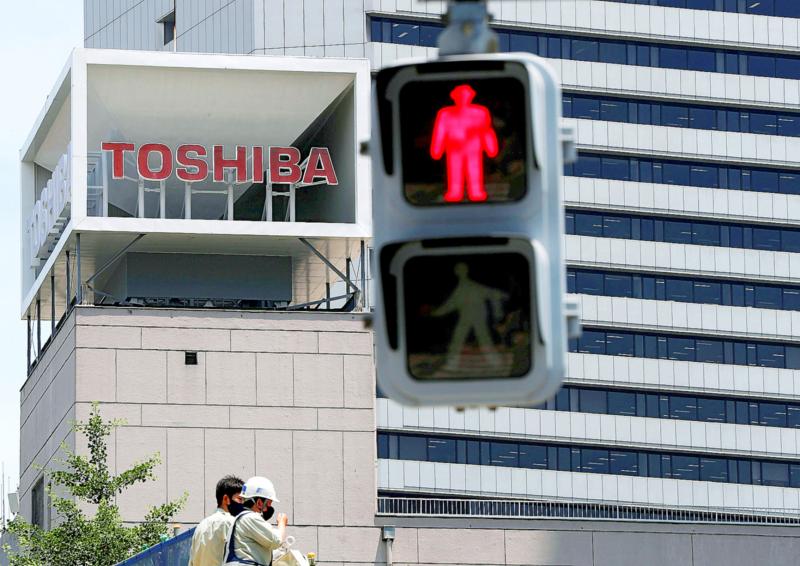Institutional Shareholder Services Inc (ISS) is recommending a vote against five Toshiba Corp board members following an independent probe that showed the company sought government help in an attempt to influence a key shareholder vote that installed its slate of directors.
The advisory firm is recommending a vote against Osamu Nagayama, Junji Ota, Nobuyuki Kobayashi, Takashi Yamauchi and Ayako Hirota Weissman, ISS said in a statement, reiterating the findings of the investigation that showed that a shareholders’ meeting in July last year “was not fairly managed.”
The probe involved a shareholder vote which went against nominees put up by Singapore-based Effissimo Capital Management Pte Ltd.

Photo: Reuters
The Japanese electronics-to-energy conglomerate “devised a plan to effectively prevent shareholders” from exercising their rights, working with the Japanese Ministry of Economy, Trade and Industry to counter activist investors, according to a 139-page report overseen by three lawyers.
The firm worked in unison with the ministry to exert pressure on 3D Investment Partners Pte Ltd, now its third-largest shareholder, which affected its voting decisions, and to influence how Harvard University’s endowment fund would vote.
3D Investment Partners is demanding the resignation of Nagayama and three directors, Reuters reported yesterday, citing a letter from the shareholder. Reuters did not name the three directors.
Toshiba was yesterday to hold an emergency board meeting, a person familiar with the matter said. Reuters reported that the board would consider reassigning candidates for the company’s audit, nominating and compensation committees following a call for change by major shareholder advisory firms.
The independent probe also details how then-chief executive officer Nobuaki Kurumatani met with then-Japanese chief cabinet secretary Yoshihide Suga, who is now the Japanese prime minister, ahead of the annual general meeting to explain the situation in person.
On another occasion, senior Toshiba executive Masaharu Kamo met Suga, who the report said expressed support for “aggressive” action to use the Foreign Exchange and Foreign Trade Act, recently enacted legislation designed to protect industries core to national security, according to the report.
Suga on Thursday rejected the contents of the report.
“I know nothing of this,” Suga said earlier in the week when asked by reporters in Tokyo about comments attributed to him in the report. “There was no such thing.”
The findings emerged from a probe proposed by Effissimo — Toshiba’s largest shareholder — and approved in March. The standoff between the secretive fund and one of the country’s most storied conglomerates has become a litmus test for Japan Inc and corporate governance across the world’s No. 3 economy.
At a briefing in Tokyo on Friday, Japanese Minister of Economy, Trade and Industry Hiroshi Kajiyama denied that he had asked a former senior adviser, Hiromichi Mizuno, to become involved with Toshiba, although he said that Mizuno had given advice on occasion.
Kajiyama said that the panel’s report did not shed definitive light on what happened, but did not rule out the possibility that the ministry would start its own investigation into the findings.
Four external board members of Toshiba’s board called the report “deeply disturbing,” and said change was needed in both the board and management.

South Korea’s equity benchmark yesterday crossed a new milestone just a month after surpassing the once-unthinkable 5,000 mark as surging global memory demand powers the country’s biggest chipmakers. The KOSPI advanced as much as 2.6 percent to a record 6,123, with Samsung Electronics Co and SK Hynix Inc each gaining more than 2 percent. With the benchmark now up 45 percent this year, South Korea’s stock market capitalization has also moved past France’s, following last month’s overtaking of Germany’s. Long overlooked by foreign funds, despite being undervalued, South Korean stocks have now emerged as clear winners in the global market. The so-called “artificial intelligence

‘SEISMIC SHIFT’: The researcher forecast there would be about 1.1 billion mobile shipments this year, down from 1.26 billion the prior year and erasing years of gains The global smartphone market is expected to contract 12.9 percent this year due to the unprecedented memorychip shortage, marking “a crisis like no other,” researcher International Data Corp (IDC) said. The new forecast, a dramatic revision down from earlier estimates, gives the latest accounting of the ongoing memory crunch that is affecting every corner of the electronics industry. The demand for advanced memory to power artificial intelligence (AI) tasks has drained global supply until well into next year and jeopardizes the business model of many smartphone makers. IDC forecast about 1.1 billion mobile shipments this year, down from 1.26 billion the prior

People stand in a Pokemon store in Tokyo on Thursday. One of the world highest-grossing franchises is celebrated its 30th anniversary yesterday.

Chinese artificial intelligence (AI) start-up DeepSeek’s (深度求索) latest AI model, set to be released as soon as next week, was trained on Nvidia Corp’s most advanced AI chip, the Blackwell, a senior official of US President Donald Trump’s administration said on Monday, in what could represent a violation of US export controls. The US believes DeepSeek will remove the technical indicators that might reveal its use of American AI chips, the official said, adding that the Blackwells are likely clustered at its data center in Inner Mongolia, an autonomous region of China. The person declined to say how the US government received